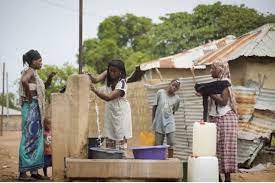By Lamin Kujabi
In a recent interview with this media about a borehole project, the Director of the Department of Water Resources, Lamin Mai Touray revealed their target to have a nationwide access to water coverage before 2025.
He informed that they have recently completed two water projects funded by Saudi Arabia through its ‘Sahel Fund’, in which they provided 27 water systems to 46 communities. He said they have another water project from the Office of the President, in which 16 water systems were provided to 37 communities.
He went on to reveal that they are implementing a project called Climate Smart Project, funded by the Africa Development Bank (ADB). The project is providing 144 water systems, out of which 140 are for the rural communities while the other 4 are for peri-urban areas.
“We are doing rehabilitation because some communities had water system long time ago and those communities have expanded. Components such as solar panels are old and they need to be replaced,’’ he explained.
Mr Touray said about two hundred and seventeen thousand people will benefit from an ADB water project. The tendering and biding, he said, will last for three months after which they will open and winners will be identified to start the work as quickly as possible.
He further disclosed that the Japanese officials are in the country and they are going to start drilling boreholes and work will be completed in July. “I told the contractor to give priority to the areas that are not accessible during the rainy season because they will be using heavy machines for drilling and it will be difficult to get access to the road,’’ he asserted.
Talking about their challenges, the Director said some communities do not take these projects seriously because they think government should do everything for them. “We expect them to take care of the boreholes so that the next village can use them”.
Talking about the impact of these projects, Mr Touray said that in some communities the number of girls going to school has increased thanks to the water projects.
He admitted that providing water is very expensive and all the water projects are through donor interventions, and that their entire ministry budget can only provide two to three boreholes.
“We are negotiating with donors so that we will be able to get more support. We are also working so that government can revise the mandate of the department because this Act has been there since 1979,’’ he noted.
He appealed to the communities to take care of the boreholes so that they can last.

